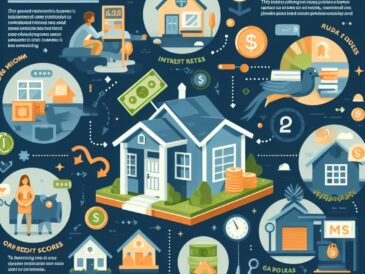For many homeowners, the thought of paying off a mortgage can seem daunting, especially when factoring in the hefty interest payments over the life of the loan. However, with the right strategies and a bit of financial savvy, it’s possible to slash thousands of dollars off your interest payments and pay off your mortgage faster than you ever thought possible. In this article, we’ll uncover the ultimate mortgage hack that can help you save big and achieve financial freedom sooner.
Understanding Mortgage Interest: Before diving into our mortgage hack, let’s first understand how mortgage interest works. When you take out a mortgage, you’re essentially borrowing money from a lender to purchase a home. In exchange for lending you the funds, the lender charges you interest, which is calculated as a percentage of the loan amount. Over the life of the loan, you’ll pay back the principal (the original loan amount) plus interest, which can add up to a substantial sum over time.
The Power of Biweekly Payments: One of the most effective ways to save on mortgage interest is by making biweekly payments instead of monthly payments. By splitting your monthly mortgage payment in half and paying it every two weeks, you’ll effectively make 13 full payments per year instead of 12. This extra payment each year goes directly towards reducing the principal balance of your loan, which not only accelerates your path to homeownership but also significantly reduces the amount of interest you’ll pay over the life of the loan.
Example: Let’s say you have a 30-year fixed-rate mortgage of $250,000 with an interest rate of 4%. By making biweekly payments instead of monthly payments, you could save over $30,000 in interest payments and pay off your mortgage more than five years ahead of schedule. That’s money that could be better spent on building wealth, pursuing your passions, or achieving your financial goals.
Automate Your Payments: To maximize the benefits of this mortgage hack, consider setting up automatic biweekly payments through your bank or mortgage servicer. By automating your payments, you’ll ensure consistency and avoid the temptation to skip or delay payments, ultimately staying on track towards your goal of paying off your mortgage early.
Other Strategies to Consider: In addition to making biweekly payments, there are other strategies you can employ to further reduce your interest payments and pay off your mortgage faster. These include:
- Making extra principal payments whenever possible
- Refinancing to a lower interest rate or shorter loan term
- Putting any windfalls or bonuses towards your mortgage principal
- Considering a lump-sum payment towards your mortgage principal
Paying off your mortgage early may seem like a daunting task, but with the right strategies and a commitment to financial discipline, it’s entirely achievable. By harnessing the power of biweekly payments and exploring other mortgage payoff strategies, you can save thousands of dollars in interest payments and achieve financial freedom sooner than you ever thought possible. So why wait? Start implementing these mortgage hacks today and take control of your financial future.
Mortgage Myths Debunked: What You Need to Know Before Buying a Home
Before embarking on the journey of homeownership, it’s crucial to separate fact from fiction when it comes to mortgages. There are many common myths and misconceptions surrounding the homebuying process and mortgage loans that can lead to confusion and potentially costly mistakes. By debunking these myths and arming yourself with accurate information, you can make informed decisions and navigate the homebuying process with confidence. Here are some key mortgage myths debunked:
- Myth: You Need a Perfect Credit Score to Qualify for a Mortgage Reality: While having a higher credit score can improve your chances of qualifying for a mortgage and securing favorable terms, you don’t necessarily need a perfect credit score. Many lenders offer mortgage programs designed for borrowers with various credit profiles, including those with less-than-perfect credit. Additionally, factors such as your income, employment history, and debt-to-income ratio also play a role in the mortgage approval process.
- Myth: You Need a 20% Down Payment to Buy a Home Reality: While a 20% down payment is often recommended to avoid private mortgage insurance (PMI) and qualify for more favorable loan terms, it’s not a strict requirement for buying a home. There are many mortgage programs available that allow for lower down payments, including FHA loans (which require as little as 3.5% down) and VA loans (which offer 0% down for eligible veterans and service members). Additionally, down payment assistance programs and grants may be available to help first-time homebuyers bridge the gap.
- Myth: Fixed-Rate Mortgages Are Always the Best Option Reality: Fixed-rate mortgages offer stable monthly payments and protection against interest rate fluctuations, making them a popular choice for many homebuyers. However, adjustable-rate mortgages (ARMs) can also be a viable option depending on your financial goals and circumstances. ARMs typically offer lower initial interest rates and monthly payments, making them attractive for borrowers who plan to move or refinance within a few years. It’s essential to carefully consider the pros and cons of each type of mortgage and choose the option that best aligns with your long-term plans.
- Myth: Pre-Qualification and Pre-Approval Are the Same Thing Reality: Pre-qualification and pre-approval are often used interchangeably, but they refer to different stages in the mortgage approval process. Pre-qualification is a preliminary assessment based on information provided by the borrower, such as income, assets, and debts. Pre-approval, on the other hand, involves a more comprehensive evaluation, including a credit check and verification of income and assets. Pre-approval carries more weight with sellers and gives you a better idea of how much you can borrow and what you can afford.
- Myth: You Should Always Choose the Lowest Interest Rate Reality: While securing a low interest rate is important, it’s not the only factor to consider when choosing a mortgage lender. Other factors, such as closing costs, loan terms, and customer service, should also be taken into account. Additionally, some lenders may offer a low initial interest rate but include hidden fees or higher closing costs, which can offset the savings. It’s essential to compare multiple loan offers and evaluate the overall cost and terms before making a decision.
- Myth: You Can’t Refinance if You Have Less Than 20% Equity Reality: While having at least 20% equity in your home can make it easier to qualify for a refinance and avoid private mortgage insurance (PMI), it’s not a strict requirement. Many lenders offer refinance programs specifically for borrowers with less than 20% equity, including FHA and VA streamline refinances. Additionally, if your home has appreciated in value since you purchased it or you’ve made significant improvements, you may have more equity than you realize, making you eligible for a refinance.
- Myth: You Can’t Buy a Home with Student Loan Debt Reality: While student loan debt can impact your ability to qualify for a mortgage, it doesn’t necessarily disqualify you from buying a home. Lenders consider various factors when evaluating your loan application, including your debt-to-income ratio (DTI), which compares your monthly debt payments to your gross monthly income. By managing your student loan debt responsibly, increasing your income, and reducing other debts, you can improve your DTI and increase your chances of mortgage approval.
In conclusion, debunking common mortgage myths is essential for making informed decisions and achieving your homeownership goals. By understanding the realities of the homebuying process and mortgage loans, you can navigate the process with confidence and avoid costly misconceptions. Whether you’re a first-time homebuyer or a seasoned homeowner, knowing the truth about mortgages empowers you to make the best choices for your financial future.
How to Pay Off Your Mortgage Early: 10 Genius Strategies That Work
Paying off your mortgage early is a goal that many homeowners aspire to achieve, as it can provide financial freedom and save thousands of dollars in interest payments over the life of the loan. While the thought of being mortgage-free may seem daunting, there are several genius strategies that can help you accelerate your mortgage payoff timeline and achieve your goal sooner than you ever thought possible. Here are 10 strategies that work:
- Make Biweekly Payments: Instead of making monthly mortgage payments, consider switching to a biweekly payment schedule. By making half of your monthly payment every two weeks, you’ll make 26 half-payments each year, which is equivalent to 13 full payments. This extra payment each year can significantly reduce your principal balance and shorten your loan term.
- Round Up Your Payments: Round up your monthly mortgage payment to the nearest hundred or even thousand dollars. For example, if your monthly payment is $1,450, consider rounding it up to $1,500 or even $1,600. The additional amount will go directly towards paying down your principal balance, helping you pay off your mortgage faster.
- Make Extra Payments Whenever Possible: Whenever you receive a windfall, such as a bonus, tax refund, or inheritance, consider putting it towards your mortgage principal. Even small additional payments can add up over time and make a significant impact on reducing your loan term.
- Refinance to a Shorter Term: If you’re able to qualify for a lower interest rate, consider refinancing your mortgage to a shorter loan term, such as a 15-year fixed-rate mortgage. While your monthly payments may increase, you’ll pay off your mortgage much faster and save thousands of dollars in interest over the life of the loan.
- Increase Your Income: Look for opportunities to increase your income, whether it’s through a raise at work, taking on a side hustle, or renting out a spare room in your home. Use the additional income to make extra payments towards your mortgage principal, accelerating your payoff timeline.
- Cut Expenses: Take a close look at your monthly expenses and identify areas where you can cut back. Whether it’s dining out less often, cancelling unused subscriptions, or shopping for better deals on utilities, reducing your expenses can free up more money to put towards your mortgage.
- Apply Windfalls to Your Mortgage: Any unexpected financial windfalls, such as a work bonus, gift, or inheritance, can be put towards your mortgage to help pay it off early. Rather than spending these windfalls on discretionary purchases, use them to make a significant dent in your mortgage balance.
- Consider Mortgage Recasting: Some lenders offer mortgage recasting, which allows you to make a lump-sum payment towards your principal and then recalculate your monthly payments based on the reduced balance. This can lower your monthly payments while keeping your payoff timeline on track.
- Automate Your Extra Payments: Set up automatic payments towards your mortgage principal to ensure that you stay consistent with your extra payments. By automating your payments, you’ll be less likely to spend the money elsewhere and more likely to stick to your payoff plan.
- Stay Motivated and Stay the Course: Paying off your mortgage early requires discipline and perseverance. Stay motivated by tracking your progress, celebrating milestones along the way, and visualizing the financial freedom that comes with being mortgage-free. Remember that every extra payment brings you one step closer to achieving your goal.
By implementing these 10 genius strategies, you can accelerate your mortgage payoff timeline, save thousands of dollars in interest, and achieve the financial freedom you’ve been dreaming of. Whether you’re a new ho



